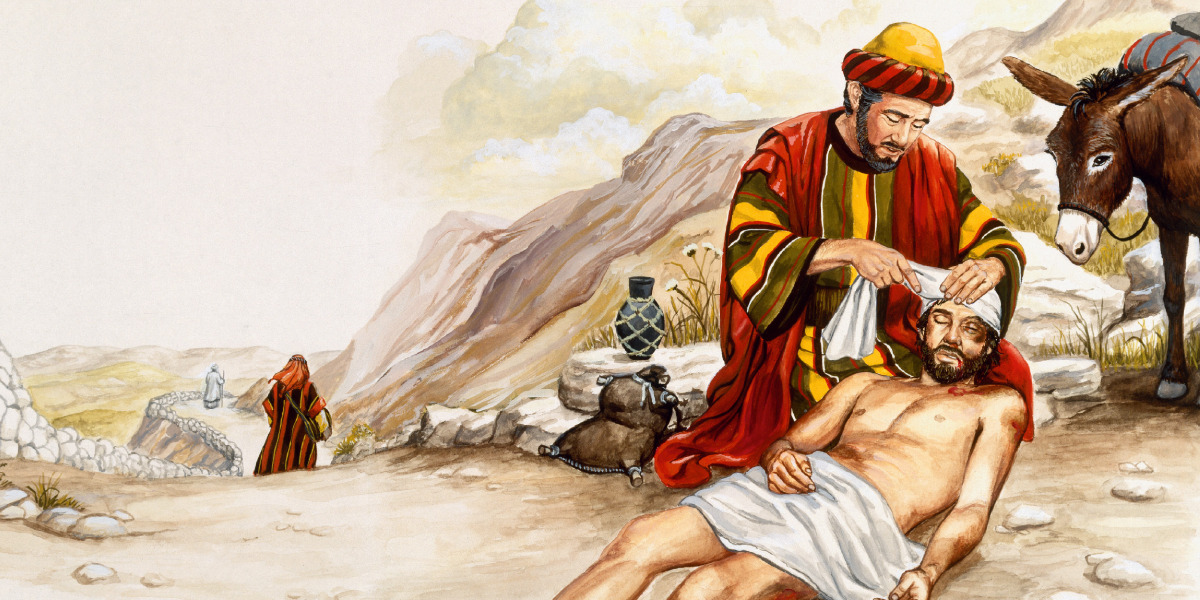Fifteenth Sunday of the Year July 13, 2025
Deuteronomy 30:10-14; Colossians 1:15-20; Luke 10:25-37
There is a story told about a small town in Germany that was severely blasted during the last war. Some years later, the buildings were restored and one was the town’s cathedral. When the renovation was complete, a large figure of Christ the King, which stood in front of the cathedral, remained unrepaired, where both the hands had been blown off in the explosion. When there was no sign of it being repaired, some people went to the parish priest to enquire about it. He surprised them all by saying that he was going to leave the statue exactly as it was. He told them that he had prepared a plaque to be place: “I have no hands; will you be my hand.”
The lawyer had asked Jesus the question, "Who is my neighbour?" Having narrated the parable Jesus confronts the lawyer with the leading question: "Which of the three do you think, was a neighbour to the man who fell into the hands of robbers?" The lawyer is forced to admit, "The one who showed him mercy." The point of the parable is not the failure of certain characters in it to show themselves neighbours but really the inclusive teaching on neighbourliness. The story of the victim on the side of the road is a challenge to examine how we see others as neighbours.
In the first reading from Deuteronomy, Moses tells the people that God’s commandment is not too hard, nor too remote. “The word is very near to you; it is in your mouth and in your heart, so that you can do it.” God’s will is not some mystery locked away in heaven or buried across the sea. It’s simple, clear, and accessible: Love God and love your neighbour.
So often we complicate religion with rules, theories, or theological debates. But at its core, God’s commandment is simple: Compassion, mercy, love.
Some insights into today’s core message – Good Samaritan
Firstly, love without Limits - Jesus overturns the lawyer’s question. It is not “Who is my neighbour?” but rather, “To whom can I be a neighbour?” The call is not to identify who qualifies for our love, but to be ready to love anyone in need, regardless of their background, religion, race, status, or nationality.
Today, this parable challenges us in a world full of divisions—between races, religions, classes, and political ideologies. Jesus doesn’t give us permission to limit our compassion based on who is like us. The Gospel calls us to cross those boundaries and love indiscriminately. That refugee, that beggar, that mentally ill person, that addict, that stranger—they are all our neighbours.
Secondly, compassion that Takes Action: The Samaritan didn’t just feel sorry; he acted. He took a risk, invested time and money, and made personal sacrifices. Christian love is not sentimental; it’s concrete. True compassion interrupts our schedules, costs us money, challenges our comfort, and may even put us at risk.
Let us examen and ask ourselves- What would I have done if I saw the man by the roadside? Would I cross to the other side? Or would I allow my heart to be moved?
Pope Francis has reminded us that we must get our hands dirty in helping others. He once said, “The Church must be a field hospital after battle.” This is not just about institutions; it’s about each of us becoming that “field hospital”—offering care, attention, and hope to the broken people we meet.
Thirdly, The Samaritan Image of Christ: On a deeper level, the Church Fathers saw the Good Samaritan as a symbol of Christ Himself. Humanity lay wounded by sin, helpless on the roadside. The Law (the priest and Levite) could not save. But Jesus, the unexpected Saviour, came to heal, to bind our wounds, and to carry us to safety. He pays the price for our healing—just as He did on the Cross—and promises to return.
When we act as Good Samaritans, we do more than help others; we become icons of Christ in the world. We imitate His mercy, His courage, and His boundless love.
At the end of this powerful story, Jesus leaves us with a command, not a suggestion: “Go and do likewise.” He doesn’t ask for admiration of the Samaritan, but imitation. The world does not need more judges. It needs more neighbours.
So let us ask ourselves today: Will I walk by on the other side? Or will I cross the road and show mercy?
In every act of love and kindness, we echo the heart of Christ. In every wounded person we help, we meet Him anew. In loving our neighbour, we draw closer to the eternal life we seek and make the gospel alive and active in us. Can you and I be the hands of Jesus today?
Happy Sunday


No comments:
Post a Comment